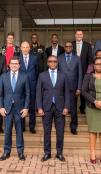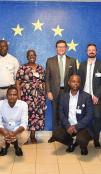Participants in EU-supported training urged to mainstream Gender in their work places

A four-day training on Gender Mainstreaming and Rights-Based Approach ended in Musanze on Friday, 28 January 2022. The training aimed at equipping the participants with skills and tools for gender mainstreaming and applying a rights-based approach in programme implementation.
In their separate testimonies, Olive Mushonganono admits that she now understands that Gender rights are Human rights in the sense that everyone was born with equal rights despite how socialization affected them and oriented each to think, behave and act in their own ways that they perceive to be correct. She adds that; “My perception and approach on gender issues has changed so much especially on family, society and in the work-place.
On her part Veneranda Tangimpundu says she has benefitted immensely from the training because it has opened up her horizon that she now understands the key concepts of gender and how they differ from the Human Rights Based Approach in relation to the existing legal framework in Rwanda. She says the knowledge she has gained will not be applied limited to her family but it will go a long way in improving gender best practices in her workplace. “On the institutional level, all the work I do will have to consider gender best practices that I believe will take Parliament to another level in its gender responsiveness”.
Speaking after the training, Vincent Nkuranga, the Special Project Implementation Unit (SPIU) Coordinator commended the participants for their commitment to the training and urged them to put into practice what they have learnt during the training. The training was conducted under the Accountable Democratic Governance Programme funded by the European Union. It covered a wide range of topics that included gender analysis, gender equality, gender equity, gender strategic needs, gender disaggregated data, gender stereotyping, gender responsiveness among others. A total of 25 participants attended the training from the Parliament, Ministry of Justice, Office of the Ombudsman, Ministry of Finance and Economic Planning (MINECOFIN) key implementers of the Programme. Other participants came from Rwanda Development Board (RDB) and the National Institute of Statistics of Rwanda (NISR).





